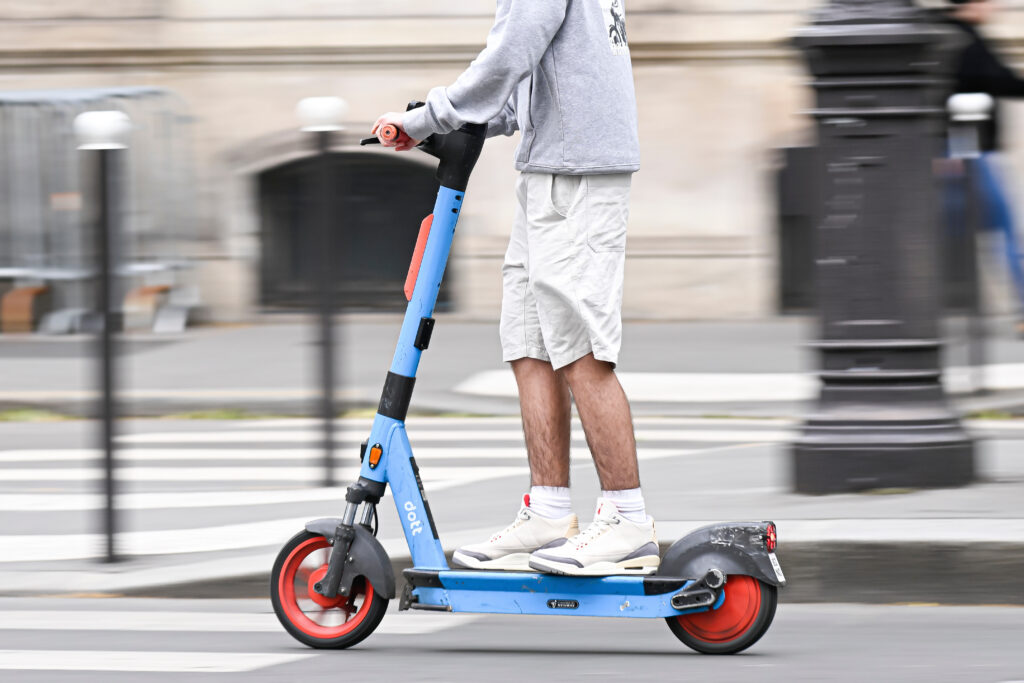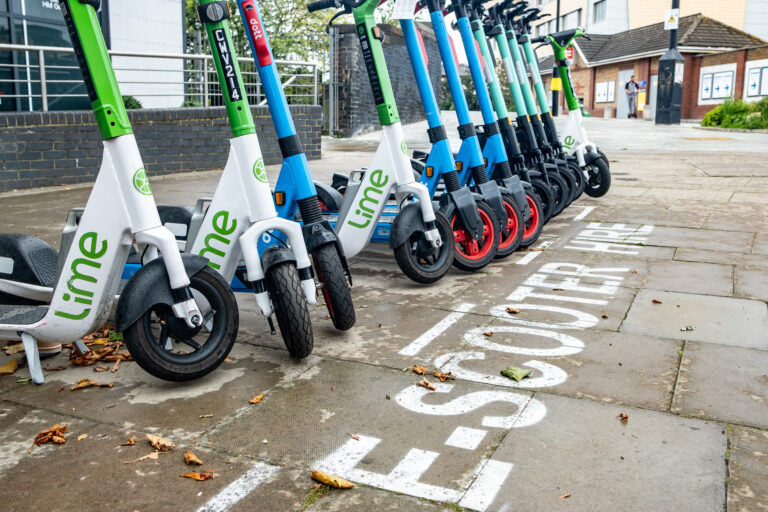E-scooters have become a familiar sight across the UK in recent years, and chances are one has whizzed past you at some point. And as their popularity grows, so does the confusion around their legal status. If you’ve ever wondered whether that rider zipping past you is actually allowed to be there, you’re not alone. Since 2020, rental e-scooters have been permitted in designated areas under a Government trial to evaluate their role in transport. Yet the UK is behind the curve, being the only developed economy besides the Netherlands that hasn’t fully legalised private e-scooters.
This cautious approach has people divided: while some see it as prudent hesitation, others view it as falling behind modern transport trends. Advocates highlight e-scooters’ potential as compact, emission-free alternatives that could ease urban congestion. Critics, however, point to safety concerns and infrastructure gaps that need addressing first. As the trial period rumbles on, the question remains: is the UK falling behind — or taking necessary precaution while others rush ahead?
Let us know what you think!
What are the current rules – and are they likely to change?
You might think electric scooters and e-bikes fall under the same road laws. However, e-scooters are actually classed as Personal Light Electric Vehicles (PLEV), meaning that under UK traffic law they are categorised as motor vehicles and as such must follow the same rules.
While private e-scooters are still illegal on public roads (with offenders risking a fine, licence points, and even having their e-scooter impounded), rental e-scooters have been allowed in designated areas as part of ongoing trials to test their role in modern transport. These trials permit riders aged 16+ with a provisional or full licence to use rented e-scooters on roads and cycle lanes – with the exception of motorways and pavements. Rentals must have a maximum speed of 15.5mph and are only permitted to carry one rider.
Being classed as motor vehicles, many of the key rules mirror those for cars. For example:
- Electric scooters need to have valid motor insurance (which is provided by rental operators).
- Phone use while riding is prohibited.
- Riding an e-scooter while intoxicated is a serious offence, equivalent to drink or drug driving laws for cars; dangerous driving offences still apply, meaning that you could lose your driving licence (minimum 12 month driving ban).
Surprisingly, helmets remain recommended but not compulsory, despite safety concerns. So, if you plan to use an e-scooter, remember that the law still applies to you!

Are these rules set to change?
In short, yes, but it might take a while. In November last year, Transport Secretary Louise Haigh indicated that the Government plans legalise private e-scooters on public roads in the future, stating that they could be a ‘really effective part’ of an integrated transport strategy. For now, the trials will continue and have been extended to May 2026, since further data and evaluation is needed. While this is promising news for e-scooter enthusiasts, there are still concerns that need to be addressed…
What are the main concerns?
E-scooters still have a way to go before they can be considered as a viable option for transport. Here are some of the key issues that are being raised.
Antisocial parking
E-scooters scattered around pedestrian areas have become a common sight in many cities, with abandoned vehicles blocking walkways and cluttering pavements. However, this is more of a problem for e-bikes, since unlike e-scooters, not all operators require bikes to be parked in designated bays. But legalising personal e-scooters could resolve this issue by allowing users to store them at home.
Another solution, which is already in force but could be expanded, is geofencing, which uses GPS technology to establish virtual boundaries around specific locations. This helps with parking management, ensuring scooters are parked in designated areas.
Fire hazard
While e-scooters offer a convenient way to navigate cities, growing concerns in London highlight the fire risks they pose. Powered by rechargeable lithium batteries, these scooters can ignite dangerous fires if the batteries are damaged or tampered with. This can be a real danger, particularly given that charging stations are mostly in communal areas.
In 2023, the London Fire Brigade responded to 199 e-bike and scooter fires, resulting in 3 deaths and 60 injuries—a 78% rise from the previous year. Steps are being taken to enforce stricter battery regulations to reduce such incidents.
Road safety
The other major concern is around road safety. The table below shows reported road collisions and casualties from 2022 and 2023, according to data from the Department for Transport:

Fortunately, the number of collisions and casualties have decreased, likely due to a combination of stricter police enforcement, improved safety measures, and a return to normality after the pandemic (the 2022 spike reflected a surge in road users after lockdown restrictions were lifted – by 2023, usage patterns had stabilised, with fewer novice riders on the road).
Could e-scooters be another answer to sustainable travel?
There is definitely an argument for the positive role of e-scooters. Many see them as a positive addition to city transport, giving people more ways to get around while reducing pollution and traffic congestion in our cities.
They are particularly beneficial to young people, who are the largest demographic of users. A study by sustainable transport charity Sustrans found that e-scooters can help 16-24 year olds have better access to education and jobs, who face greater transport barriers than other age groups due to lower income and car ownership.
Cutting emissions, not corners
E-scooters could play a small but helpful role in supporting the UK’s net zero ambitions. As zero-emission vehicles, they help reduce air pollution and carbon footprints, particularly for short trips where cars are most inefficient. Their compact size means they take up minimal road space, easing traffic congestion in crowded areas.
So it seems e-scooters are here to stay, and they’re only becoming more popular, so legalising them doesn’t sound like such a bad idea. Proper legislation would eliminate some of the key problems faced at the moment, and could pave the way for safer, cleaner, and more efficient urban travel.
Sources: Forbes, Sustrans, Department for Transport, Cities Today
You could also read:
- Should pavement parking be banned?
- Car insurance prices drop 23% for young drivers!
- Rising road tax costs: what businesses need to know
- 20mph zones – how effective are they?
- Chocflation: What’s behind the Easter Egg price hike?
This is a marketing blog by Howden Insurance.

